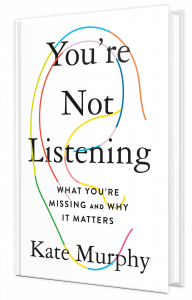What do a CIA interrogator, a focus group moderator, and a radio show producer have in common?
They're all good listeners.
In her new book, You're Not Listening, New York Times contributor Kate Murphy shares wisdom from some of the world's best listeners. Despite living in a world where technology allows constant digital communication and opportunities to connect, it seems no one is really listening or even knows how. And it’s making us lonelier, more isolated, and less tolerant than ever before. In this illuminating and often humorous deep dive, Murphy explains why we’re not listening, what it’s doing to us, and how we can reverse the trend.

Available now from:
Barry McManus worked for the CIA for 25 years. As chief interrogator, his most important skill was listening. Instead of bullying people into fessing up, his approach was to be patient and be a good listener.
Interrogation doesn’t work with terrorists, so why would it work when you meet someone at a social gathering? Peppering people with appraising and personal questions like “What do you do for a living?” or “What part of town do you live in?” or “Are you married?” is interrogating. You’re not trying to get to know them. You’re sizing them up. It makes people reflexively defensive and will likely shift the conversation into a superficial and less-than-illuminating résumé recitation or self-promoting elevator pitch. Listening for things you have in common and gradually building rapport is the way to engage with anyone, be it a terrorist or a stranger at a party.
Renowned focus group moderator Naomi Henderson has professionally listened to more than 50,000 people. One of her greatest talents is asking questions that don’t rob people of their stories. For example, when moderating a focus group for a grocery store chain that wanted to find out what motivates people to shop late at night, she didn’t ask participants obvious questions like “Do you shop late at night because you didn’t get around to it during the day?” or “Is it because stores are less crowded at night?” These are logical reasons to shop at night and likely would have gotten affirmative responses had she asked.
Nor did Naomi simply ask why they shopped late at night. “Why?” tends to make people defensive. Instead, Naomi turned her question into an invitation: “Tell me about the last time you went to the store after 11:00 p.m.” That's when people open up.There are eight people on Fresh Air’s radio production staff. The key qualification for the job is conversational sensitivity, or "good ears." People who have conversational sensitivity not only pay attention to spoken words, they also have a knack for picking up hidden meanings and nuances in tone. You can’t be good at detecting intricate cues in conversation if you haven’t listened to a lot of people.
By the time a Fresh Air episode is finally aired, all the producers might listen to an interview three to four times. With each rewind and replay, they pick up not just subtleties in expression and meaning but also telling inhalations, pauses, and perhaps barely audible fidgeting in the background. When is an "um" or "uh" significant? Is that breath right there important? Why did he keep repeating that word? It makes you aware of how much information can be hidden in a single sentence.
Learn from some more of the world's best listeners in You're Not Listening: What You're Missing and Why It Matters by Kate Murphy, on sale now everywhere books are sold.
"You’re Not Listening is an essential book for our times. How well we listen determines how we love, learn, and connect with one another, and in this moment when we need to hear and be heard more than ever, this thought-provoking and engaging book shows us how."
—Lori Gottlieb, New York Times bestselling author of Maybe You Should Talk to Someone